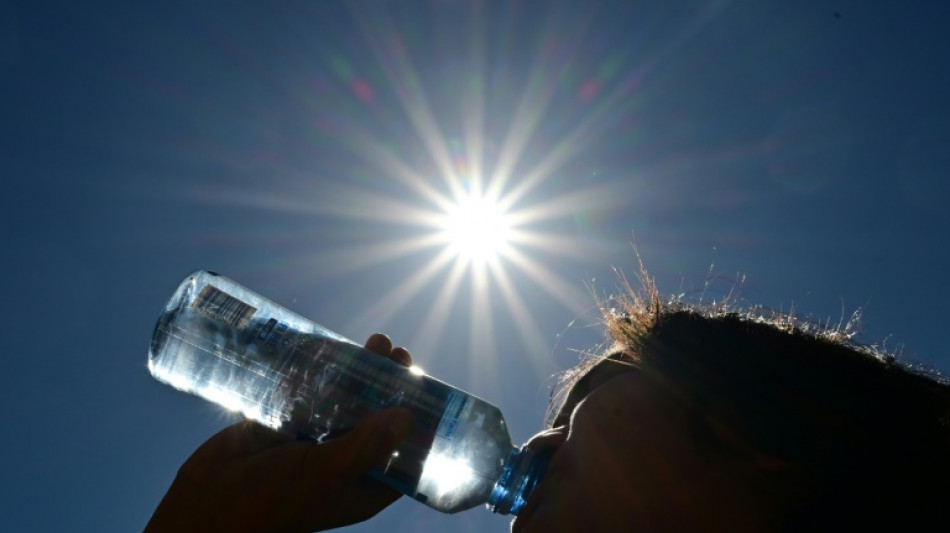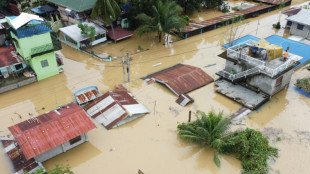
-
 Gaza hospital shut after Israeli raid, director held: health officials
Gaza hospital shut after Israeli raid, director held: health officials
-
Surgery for French skier Sarrazin 'went well': federation

-
 Mitchell, Bracewell boost New Zealand in Sri Lanka T20
Mitchell, Bracewell boost New Zealand in Sri Lanka T20
-
Kyrgios says tennis integrity 'awful' after doping scandals

-
 S. Korean prosecutors say Yoon authorised 'shooting' during martial law bid
S. Korean prosecutors say Yoon authorised 'shooting' during martial law bid
-
Vendee Globe skipper Pip Hare limps into Melbourne after dismasting

-
 Reddy's defiant maiden ton claws India back into 4th Australia Test
Reddy's defiant maiden ton claws India back into 4th Australia Test
-
Doubles partner Thompson calls Purcell doping case 'a joke'

-
 Reddy reaches fighting maiden century for India against Australia
Reddy reaches fighting maiden century for India against Australia
-
Sabalenka enjoying 'chilled' rivalry with Swiatek

-
 Political turmoil shakes South Korea's economy
Political turmoil shakes South Korea's economy
-
New mum Bencic wins first tour-level match since 2023 US Open

-
 'Romeo and Juliet' star Olivia Hussey dies aged 73
'Romeo and Juliet' star Olivia Hussey dies aged 73
-
Brown dominates as NBA champion Celtics snap skid

-
 Indian state funeral for former PM Manmohan Singh
Indian state funeral for former PM Manmohan Singh
-
France asks Indonesia to transfer national on death row

-
 Ambitious Ruud targets return to top five in 2025
Ambitious Ruud targets return to top five in 2025
-
Late bloomer Paolini looking to build on 'amazing' 2024

-
 Australia remove Pant, Jadeja as India reach 244-7 at lunch
Australia remove Pant, Jadeja as India reach 244-7 at lunch
-
Scheffler sidelined by Christmas cooking injury

-
 Rice seeks trophies as Arsenal chase down 'full throttle' Liverpool
Rice seeks trophies as Arsenal chase down 'full throttle' Liverpool
-
Trump asks US Supreme Court to pause law threatening TikTok ban

-
 Arsenal edge past Ipswich to go second in Premier League
Arsenal edge past Ipswich to go second in Premier League
-
LawConnect wins punishing and deadly Sydney-Hobart yacht race

-
 Ronaldo slams 'unfair' Ballon d'Or result after Vinicius snub
Ronaldo slams 'unfair' Ballon d'Or result after Vinicius snub
-
Several wounded N.Korean soldiers died after being captured by Ukraine: Zelensky

-
 Fresh strike hits Yemen's rebel-held capital
Fresh strike hits Yemen's rebel-held capital
-
Netflix with Beyonce make splash despite NFL ratings fall

-
 Bird flu mutated inside US patient, raising concern
Bird flu mutated inside US patient, raising concern
-
Slovakia says ready to host Russia-Ukraine peace talks

-
 Maresca challenges Chelsea to react to Fulham blow
Maresca challenges Chelsea to react to Fulham blow
-
Tech slump slays Santa rally, weak yen lifts Japan stocks higher

-
 Test records for Zimbabwe and Williams as Afghanistan toil
Test records for Zimbabwe and Williams as Afghanistan toil
-
LawConnect wins punishing Sydney-Hobart yacht race

-
 Barca's Yamal vows to 'come back better' after ankle injury
Barca's Yamal vows to 'come back better' after ankle injury
-
Olmo closer to Barcelona exit after registration request rejected

-
 Watching the sun rise over a new Damascus
Watching the sun rise over a new Damascus
-
Malaysia man flogged in mosque for crime of gender mixing

-
 Montenegro to extradite crypto entrepreneur Do Kwon to US
Montenegro to extradite crypto entrepreneur Do Kwon to US
-
Brazil views labor violations at BYD site as human 'trafficking'

-
 No extra pressure for Slot as Premier League leaders Liverpool pull clear
No extra pressure for Slot as Premier League leaders Liverpool pull clear
-
Tourists return to post-Olympic Paris for holiday magic

-
 'Football harder than Prime Minister' comment was joke, says Postecoglou
'Football harder than Prime Minister' comment was joke, says Postecoglou
-
Driver who killed 35 in China car ramming sentenced to death

-
 Bosch gives South Africa 90-run lead against Pakistan
Bosch gives South Africa 90-run lead against Pakistan
-
French skier Sarrazin 'conscious' after training crash

-
 NATO to boost military presence in Baltic after cables 'sabotage'
NATO to boost military presence in Baltic after cables 'sabotage'
-
Howe hopes Newcastle have 'moved on' in last two seasons

-
 German president dissolves parliament, sets Feb 23 election date
German president dissolves parliament, sets Feb 23 election date
-
Slot says 'too early' for Liverpool title talk

| RBGPF | 100% | 59.84 | $ | |
| CMSD | -0.67% | 23.32 | $ | |
| NGG | 0.66% | 59.31 | $ | |
| SCS | 0.58% | 11.97 | $ | |
| RIO | -0.41% | 59.01 | $ | |
| BTI | -0.33% | 36.31 | $ | |
| BP | 0.38% | 28.96 | $ | |
| CMSC | -0.85% | 23.46 | $ | |
| BCC | -1.91% | 120.63 | $ | |
| AZN | -0.39% | 66.26 | $ | |
| VOD | 0.12% | 8.43 | $ | |
| RYCEF | 0.14% | 7.27 | $ | |
| JRI | -0.41% | 12.15 | $ | |
| RELX | -0.61% | 45.58 | $ | |
| GSK | -0.12% | 34.08 | $ | |
| BCE | -0.93% | 22.66 | $ |

Southern US set to sizzle under prolonged heat wave
More than 50 million Americans are set to bake under dangerously high temperatures this week, from California to Texas to Florida, as a heat wave builds across the southern United States.
A mass of hot air was settling over southwestern desert states, the National Weather Service (NWS) warned, with parts of Arizona, Nevada and New Mexico at risk of seeing the mercury soar past 100 degrees Fahrenheit (38 C).
The NWS has issued excessive heat warnings for the southern and central regions of California, with temperatures expected to hit even as high as 112 degrees Fahrenheit in parts of Los Angeles County after Tuesday.
"Heat is the number one weather-related killer," the NWS in Las Vegas warned, saying this level of "extreme heat with little to no overnight relief affects anyone without effective cooling and/or adequate hydration."
The new warnings come after world daily temperature records were smashed on three days last week, according to preliminary data.
On July 6 the planet's average surface temperature was 17.23C (63.01F), an unofficial record, according to the University of Maine's Climate Reanalyzer tool, which uses a combination of observations and computer modeling.
Climate scientists are sounding alarm about the impact of human-caused global warming, and warning 2023 is on track to be the warmest since records began.
In Texas, which is experiencing a prolonged "heat dome" in which warm air is trapped in the atmosphere like a convection oven, the border city of El Paso broke the record for most consecutive 100 F days on Sunday, according to the NWS.
The number is now 24, beating 23 days in 1994.
"Looks like plenty of more 100+ degree days on the horizon," the office said.
And the heat wave in Arizona could prove to be "one of the longest if not the longest, depending on how it is measured," the NWS in Phoenix said.
The area has now seen 10 days of temperatures at or above 110 degrees.
Aid organizations in Tucson, about two hours away, handed out ice and bottles of water and Gatorade over the weekend, according to the New York Times.
- 'Hottest week on record' -
Dehydration is a major summertime risk in the United States.
Last week, a man died in California's Death Valley, which authorities said could likely be attributed to the heat. His car had two flat tires and the air conditioning had stopped working.
In addition to extreme heat, authorities in the Golden State are raising the alarm over flash flooding as high temperatures melt the deep snowpack that fell on the Sierra Nevada mountains last winter over several intense storms.
The northeastern United States also faced flooding Monday after heavy rain across several states washed out highways and killed at least one person in New York state.
Scientists say rising global temperatures -- caused largely by burning fossil fuels -- are aggravating extreme weather worldwide.
Global surface temperatures have increased by about 2F (1.1C) since 1880, making extreme heat more frequent, while a warming earth intensifies the risk of heavy rain because a warmer atmosphere holds more water.
According to the United Nations' World Meteorological Organization, "the world just had the hottest week on record, according to preliminary data."
Extreme heat is the deadliest weather hazard in the United States, according to official data, with the elderly, the very young, people with mental illness and chronic diseases at highest risk.
T.Vitorino--PC




